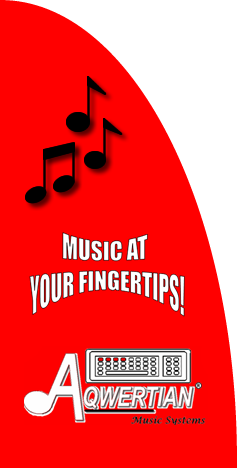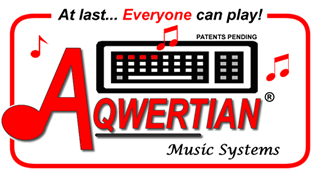

|
EXECUTIVE SUMMARYAqwertian Music Systems is an Independent Software Developer based in Ridgecrest, California. The company’s core products, as well as the opportunity to be presented, is a suite of software applications that enables a PC and a Game Console (when ported and used with a qwerty keyboard) to function as a universal music performance instrument. This involves a significant paradigm shift which is the foundation of Aqwertian ® Music.
Value Proposition: The Home Entertainment Market is one of the fastest growing market places in the world today. At $11 billion annually and projected to double in five years, a significant number of companies have recognized this opportunity and are spending hundreds of millions of dollars in research and development with the intention of bringing to market novel products that have global appeal, sustained revenue, repetitive sales and a high profit margin. Within this context the music software industry with its high profile “international language and constituency “has grappled for years in attempts to enable the computer keyboard to function as a music performance instrument. The vast installed base of users has made this an obvious objective and one full of promise. Nearly all have floundered on the belief that the qwerty key to musical note/pitch assignments need to remain as fixed relationships (one qwerty key equals one note or perhaps with the application of the shift key the same note but different octave) or risk a disruptive and fatal cognitive dissonance in the player's mind. Caught within this mindset these earlier attempts embody key/note relationships that make the fingering of all but the simplest note sequences, physically and musically unplayable. In practice the requirement for a fixed relationship has proven false and university studies have now substantiated that this is not a valid restraint. These studies have shown that our musical right brains are instead busily focusing on the notes (sounds) being produced and their correctness vis-à-vis a previously learned or expected note progression (song/melody). Free of this false constraint, Aqwertian Music, via its’ patented key/note assignment algorithms produces physically possible fingering on the keyboard that can be played in a fluid manner, the goal that has eluded all previous attempts. Floating (reassigning) the qwerty key-to-note assignments within a musical piece not only enables physically possible fingering in all cases but also enables advanced play. Up to eight simultaneous finger depressions are possible. As a result a wide spectrum of music is facilitated and players at all skill levels from beginner to expert can feel a deep sense of accomplishment and enjoyment. Importantly, Aqwertian algorithms do all of this while preserving the traditional qwerty-key-finger assignments learned for touch-typing. Aqwertian Music very purposefully works to capitalize on the unconscious neuromuscular (muscle memory) learning made possible by the left-brain. Thus the rapid eye-brain-finger translation capability that individuals use on a daily basis to input information into PCs is preserved. The hard-earned proficiency musicians’ gain from years of practice is founded on this exact same left-brain training. Thus unbeknownst to them, hundreds of millions of computer users throughout the world have become proficient at fingering a Universal Keyboard Instrument. Finally, since Aqwertian Music note instructions are displayed in English (or other local language) there is no prerequisite to learn traditional notation to begin playing rewardingly.
Foundation of Opportunity: Man’s love affair with all things music is omnipresent and transcends language, culture, and geography. A significant aspect of this fascination is the desire to play (perform) music. This aspiration is timeless and of universal interest. In addition, the perceived social value of being able to play music has always been high. In an April, 2003, a Gallup Poll on Music Interest found that 84% of the adults surveyed indicated that they wished they had learned to play a musical instrument as children. Even more relevant to this opportunity, 67% indicated they would still like to learn to play a musical instrument. Also very pertinent is that 38% have read, seen, or heard about the educational benefits of playing a musical instrument and an overwhelming majority, 73%, believe that children should be exposed to music before age 5. Unfortunately this study also found that less than 10% actually ever study any form of music and the percentage of adults studying music is even lower. The point here is that although music plays a well-recognized and vital role in society and playing music is an esteemed activity, and that most people yearn to play an instrument, traditional methods of encouraging and facilitating learning a music instrument remain discouragingly unsuccessful. Like many other tasks made easier by the power of the PC, Aqwertian Music addresses the above dichotomy by transforming the PC into a stand-alone musical instrument. In addition to the floating note-key assignments described above, this is accomplished by turning music scores into familiar letters and graphics and thus typing capability into music-playing ability. By doing so we directly supply a solution that stimulates and supports the expressed value placed on attainment of a music performance ability indicated by the Gallup Study. A person can read and study music, listen to music, watch movies about the lives and times of musicians and even attend live performances of music, but none of these experiences compare to playing an instrument and none are of lasting encouragement to the person that would love to play. The power of Aqwertian music is the early success it brings. If one possesses even a beginning comfort level on the qwerty keyboard they are immediately afforded a rewarding and captivating experience while playing both their choice of instrument and favorite genre of music. Yet to be seen, but a hoped for positive result of the early success experienced by a large population exposed to Aqwertian Music, will be a quantum leap in the number of individuals taking up traditional instruments. Target Market Characteristics: Although the Home Entertainment industry favors low risk, high profit sequels built on established franchises, top titles often take millions of dollars and years to produce while remaining very risky. Most titles fail to reach their hoped for sales levels. One of the big challenges is the lack of exciting new content and there is a high-pressure search for new game ideas built on existing genres. Discovering a unique new video game/entertainment franchise with near universal appeal would be a tremendous catalyst in the industry. Aqwertian Music has this potential and with only moderate fiscal and physical challenges. In addition Aqwertian Music’s ability to bring an immediately rewarding experience has a direct impact on its’ target audiences which will produce a consistent, repetitive revenue stream. This will come in the form of additional music selections being purchased at retail or downloaded. In addition to a wide spectrum of the general population, schools, churches, youth and senior centers, are only a few examples of institutions with access to PCs that could benefit from the Aqwertian capability. As example, given the limited resources now available, entire school systems are searching for ways to reduce their budgets yet continue music education as part of the curriculum. If it was not for private donations and support, many music departments would be eliminated. Aqwertian Music affords these schools the opportunity to teach and play music utilizing the ever-growing installed base of PCs. Aqwertian music offers an unprecedented opportunity for synergy between the school computer labs and music departments while compounding the educational value delivered by the PC platform. Supply Chain Perspective: Aqwertian Music enhances and stimulates sales in the following markets:
Many of these, in their own way, are addressing and promoting the PC and or Game Console convergence with couch-centric diversions, a primary competitive goal of the home entertainment marketplace today. We provide the cornerstone for a totally new genre and perhaps franchise of interactive products by enabling end users to play a universal musical instrument. The Aqwertian capability also offers significant promise as an enabler of a new portable music player based on a qwerty keyboard interface. This could add a whole new dimension to the exploding portable music market.
Contact Information: Jim Fallgatter Founder/CEO Aqwertian Music Systems (562) 355-8172 ♫ (760) 446-5941
AQWERTIAN MUSIC END USER VALUE PROPOSITIONFOR:
WHO:
WE:
THAT:
UNLIKE: Other ‘Instrument’ choices it…
*March, 2003, Gallup Poll: American Attitudes Towards Music
AQWERTIAN MUSIC INDUSTRY VALUE PROPOSITIONFOR:
WHO:
WE provide:
THAT insures:
UNLIKE other interactive genres/franchises:
WE also:
|


